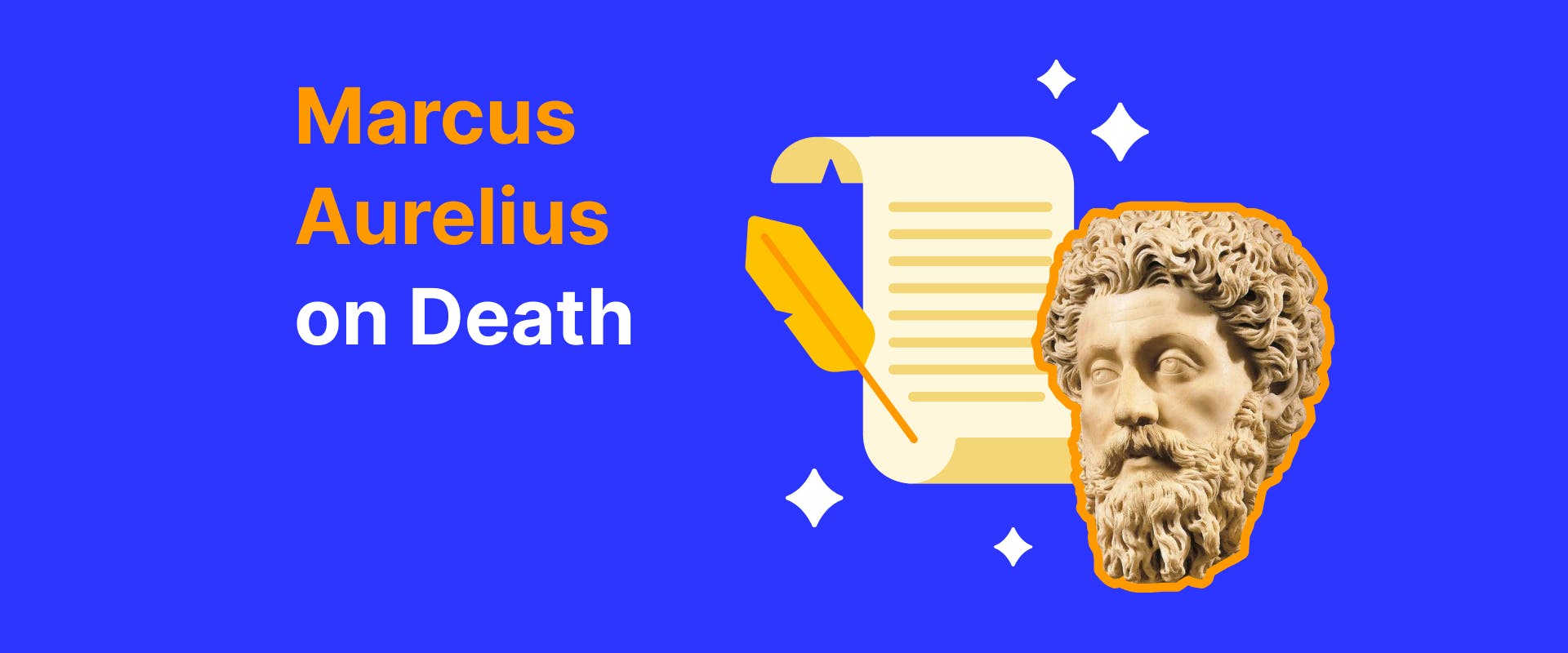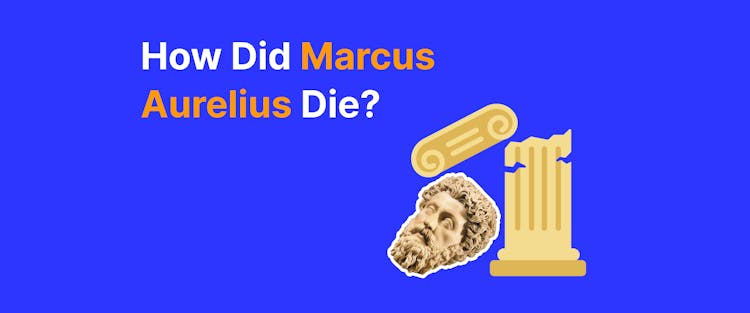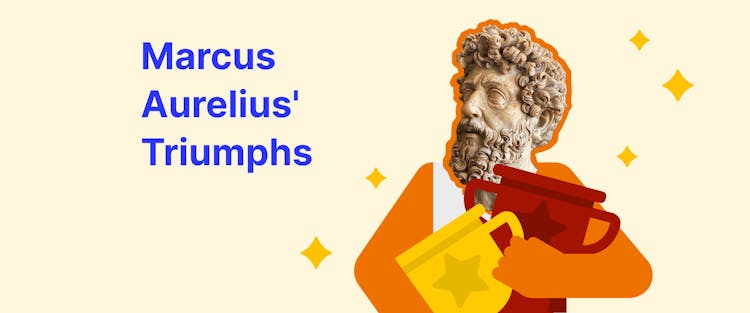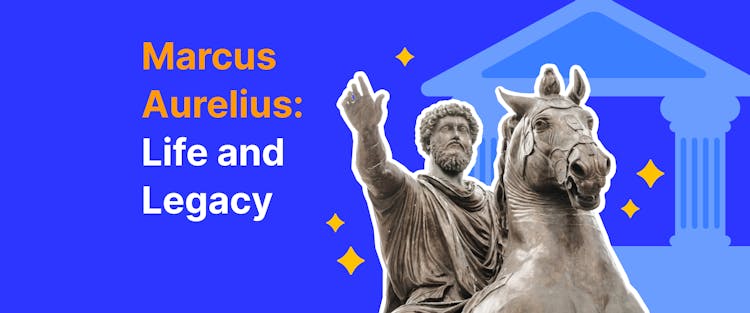Marcus Aurelius reflected deeply on death and impermanence in his writings, captured in "Meditations." He embraced the Stoic philosophy of memento mori, which means "Remember you will die." This concept was a reminder of our mortality, encouraging individuals to reflect on life's brevity and follow one's values and principles.
Marcus Aurelius believed in accepting death as a natural part of the human experience, emphasizing the importance of focusing on the present moment and living virtuously. His stoic views on death were centered around the idea that understanding and accepting death could lead to a deeper appreciation of life and a more peaceful state of mind. Let's now explore some of his insightful quotes on death, shedding light on our brief time here and the peace that comes with accepting it.
Marcus Aurelius' quotes about death
If you delve into the thoughts from the diary of Marcus Aurelius, the first topic that stands out is the way he sees the present and death interwoven. He believes everyone has a gift, a talent, or a mission in life in different degrees. He advocates for living each moment with purpose and integrity, urging us not to waste a single breath on a life not worth living.
"Perfection of character is this: to live each day as if it were your last, without frenzy, without apathy, without pretense."
"In everything that you do, pause and ask yourself if death is a dreadful thing because it deprives you of this."
"Stop whatever you're doing for a moment and ask yourself: Am I afraid of death because I won't be able to do this anymore?"
"But death and life, success and failure, pain and pleasure, wealth and poverty, all these happen to good and bad alike, and they are neither noble nor shameful—and hence neither good nor bad."
"We ought to consider not only that our life is daily wasting away and a smaller part of it is left, but also that if a man should live longer, it is quite uncertain whether the understanding will continue sufficient for the comprehension of things and retain the power of contemplation that strives to acquire the knowledge of the divine and the human."
"Do not act as if you had ten thousand years to throw away. Death stands at your elbow. Be good for something while you live and it is in your power."
On the other hand, Marcus Aurelius talks about the impermanence of being:
"Everything of the body is a river. Everything in the soul is dream and vapor. Life is war and the abode of a stranger. The only fame after death is oblivion."
"Death is a cessation from the impression of the senses, the tyranny of the passions, the errors of the mind, and the servitude of the body."
"Meditate upon what you ought to be in body and soul when death overtakes you; meditate on the brevity of life, and the measureless gulf of eternity behind it and before, and upon the frailty of everything material."
Marcus Aurelius also believes that death is a physiological and natural process that awaits everyone:
"Don't look down on death, but welcome it. It, too, is one of the things required by nature. Like youth and old age. Like growth and maturity. Like a new set of teeth, a beard, and the first gray hair. Like sex and pregnancy and childbirth. Like all the other physical changes at each stage of life, our dissolution is no different. So this is how a thoughtful person should await death: not with indifference, not with impatience, not with disdain, but simply viewing it as one of the things that happen to us. Now you anticipate the child’s emergence from its mother's womb; that's how you should await the hour when your soul will emerge from its compartment."
Philosophy of Stoicism
Stoicism teaches that the universe is deterministic. Although people can control their actions, everything that happens to them or their loved ones is beyond their control. In essence, Stoicism tells us that we can't control the world around us, only our reactions to it. This philosophy suggests that since we can't always reach external goals, our true power lies within us. Our only real freedom lies in aligning ourselves with fate.
Living "in harmony with nature" is the ultimate goal, the key to achieving inner peace. According to Stoics like Marcus Aurelius and Seneca, happiness comes from maintaining a tranquil spirit, undisturbed by desires or fears that stem from placing too much importance on things that don't truly matter. When we act on these misguided impulses, they become overwhelming passions.
A decent life
Personal immortality is impossible in a Stoic system. Each person returns to nature, and each soul returns to the Original Cosmic Fire at the right time. For the Stoic philosopher, the value of life is not its duration but how it is lived. Only then is a man's life considered decent when it is lived with courage, moderation, justice, and wisdom.
It is essential to understand that virtue is not a tool for a decent life. In Stoic ethics, morality is never seen as a means to an end but always as an end in itself. A vicious character is the worst fate we can suffer - the only terrible thing. Virtue itself is a reward: the highest and only good in life.
Lessons for modern life
Stoicism is not a set of innate personal qualities but a philosophical system that includes theoretical provisions on eternal questions, like that of life and death, various techniques, and practical exercises. Recognizable at its core, we can understand Stoicism theoretically, like any philosophical system. Moreover, as a practical philosophy, it is available for application by anyone and anywhere, including us in our present.
Connection with psychotherapy
In addition to the Stoics themselves, American psychotherapists noticed this and began to talk about the possibility of using Stoic practices in the methods of cognitive-behavioral therapy, which is based on such assumptions:
Psychological problems are partly based on incorrect or unproductive ways of thinking. A life crisis can emerge when someone struggles to achieve critical life goals and cannot navigate these challenges alone. The attempt to manage overwhelming stress can lead to significant physical and emotional strain during such crises. This typically occurs when an individual is confronted with situations requiring substantial changes in their lifestyle, thought processes, self-view, interactions with their surroundings, and deep-seated existential questions.
People can learn better ways to cope with psychological problems, thereby alleviating symptoms and becoming more productive in their lives. Thus, for instance, from Marcus Aurelius' quotes, there's value in facing fears directly and mentally rehearsing potential distressing situations to be well-prepared for actual occurrences.
Agnosticism
Modern Stoicism tends to lean towards agnosticism, neither affirming nor denying an afterlife. Our knowledge here is limited, placing such matters in the realm of the 'indifferent.' Followers of this theory develop virtue not to improve the afterlife but to be happy now. They hope this "present" will somehow be transferred to the future; if not, it will always remain with us.
Life with a purpose
Reflect on this:
The fear of death isn't about the end itself, as we're usually in the dark about the specifics of our demise. Rather, we are frightened by the very prospect of no longer existing.
Think about the fact that you also did not exist before you were born. You weren't here thousands of years ago; you weren't here even the day your parents met. You do not even think about it. The anxiety about ceasing to exist again seems illogical.
Marcus Aurelius' death quote, "It is not death that a man should fear, but rather he should fear never beginning to live," is so motivated and deep. In a world rife with wrongdoing, a life devoid of purpose and virtue is arguably a fate worse than death or a brief existence. Life can be not so long but bright and full of meaning. This is a happiness to find the meaning of life.

It is ridiculous to spend a short living time on things that are not valuable or useful. It is significant to analyze your inner world and actions every day. Ask yourself, "Where am I going? What is my goal? How am I growing or changing? Can I be useful to others or love people around me?" This is pretty much from Marcus Aurelius' message.
But who was he? What shaped him to be the person we know from the pages of "Meditations?
Historical context
During a time of turmoil, Marcus Aurelius stood out as a thinker and a leader, blending wisdom with action to protect the Roman Empire. He remains one of the most powerful emperors of the once-undefeated Roman Empire and one of the most significant philosophers of all times. What shaped Marcus Aurelius to be the person he was? Let's dive in and explore.
Defender of the Roman Empire
Marcus Aurelius Antoninus was a Roman emperor. He was not only one of the most famous Stoics in history (even during his lifetime, he was called the philosopher on the throne), but he also spent half of his reign defending the empire from barbarian raids. So, Marcus lived in such dangerous life conditions that he could die any day. War is when people reevaluate their lives and values; many things become unimportant, relationships become vital, and life is seen as a precious gift. And this is exactly what shaped him and his philosophy.
In his lifetime, Marcus had to lead the Roman legions without any military training or experience. Emperor Antoninus prepared the future successor for administrative and bureaucratic tasks, so Marcus Aurelius received an education in rhetoric, philosophy, and law. However, shortly after he inherited power, barbarians began encroaching on the empire's borders from the east and north. So later, the emperor had to lead these military campaigns. The common theme of Stoic writers is to live each day as if it were the last. From his philosophical diary, we learn about how Marcus Aurelius was immersed in Stoicism and how it helped him sustain himself in military campaigns:
"Do every act of your life as though it were the very last act of your life.”

Wartime Challenges
War is an increased risk of death for both military and civilians. The researchers note that, based on available cross-sectional data, there is a link between a Stoic attitude toward death and a reduction in fear of death. Not only death is frightening in war. Sometimes, even more than death, we fear the possibility of injury, maiming, torture, or disease caused by wartime conditions. Unfortunately, there is no Stoic technique that can eliminate the danger of such things, unless your decisions are guided by the Stoic virtues of wisdom and moderation.
Among other things he learned during his military campaigns and shared with the readers is that, in war, there are always those who are directly to blame for our troubles and sufferings; this is the enemy side. But, unfortunately, hatred does not kill the enemy - it kills us. "The best defense is not to imitate" is yet another wise quote of Marcus Aurelius, commander-in-chief of the world's largest and most professional army at the time.
Death is the Final Test
This legendary man and Roman ruler deserves our attention today, even though he lived in the 2nd century, since, as it turns out, people at any given time in history have had similar experiences and thoughts. Much is changing in the world. Technologies have evolved, medicine is at a very high level, and the standard of living is incomparably different than in ancient times. But no one can defeat physical death. Every person comes into this world, and the time comes for everyone to end their life on this earth.
A Stoic such as Marcus Aurelius or Epictetus wants to live well and to live well means dying well. A Stoic lives well through good character; death is their final test. Although every death will be slightly different, the Roman Stoics believed that a good death would be characterized by peace of mind, lack of regret, and gratitude for the life we have been given.
Marcus Aurelius and Commodus: A Tale of Two Emperors
Commodus was a Roman Emperor who reigned from 180 to 192 AD and the son of Marcus Aurelius.
While his father paved the way for future generations of Stoics, Commodus lived somewhat contrary to his father's ideals. In the face of absolute power and luxury, Commodus chose to indulge his desires instead of choosing Stoic virtues like modesty, self-restraint, community service, and pursuing equality for all human beings.
Thus, Commodus's reign marked a significant departure from his father's principles and is often cited as the beginning of the decline of the Roman Empire. After the death of Marcus Aurelius in 180 AD, Commodus came to power and, overwhelmed with power, became a tyrannical ruler. Discontentment with his erratic behavior grew over the years, and in 192 AD, he was assassinated as a part of the conspiracy involving his mistress.
One of the most famous Stoic quotes by Marcus Aurelius was,
"Waste no more time arguing what a good man should be. Be one."
It is sad to admit that in the heart of ancient Rome, amidst the challenges of leadership and the uncertainties of the future, his own son didn’t learn from his life lessons and met his own death not as a good man surrounded by loved ones but as a tyrant, ultimately betrayed by those closest to him in a shadowy end to his reign.

Read the summary of "Meditations"
So, everyone thinks at least sometimes about their death, and many are afraid of it. The Marcus Aurelius quotes about death that we looked at and analyzed gave us a great thought-provoking opportunity to overcome fear and face it. We live in just as tumultuous a time as Marcus Aurelius did in the Roman Empire, which was constantly in a state of war and danger. Such difficult circumstances make people sober and remind them about the value of life and its transience.
It motivates us to move forward, to be alive, and maybe even to see life more brightly. Therefore, development and learning are extremely important for knowing yourself and the world.
You can read a summary of Marcus Aurelius' "Meditations" in the Headway App and delve into the ideas of the Stoic philosophy and his life-changing musings on the impermanence of life, a theme that resonated deeply within the heart of ancient Rome. This reflection encourages us to embrace the fleeting nature of our existence with grace and wisdom.








